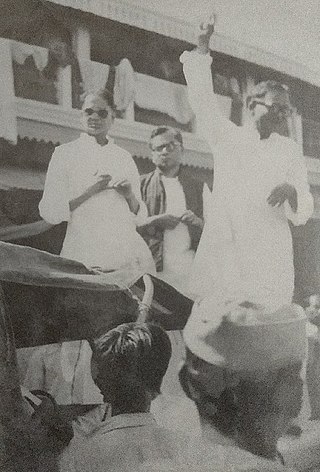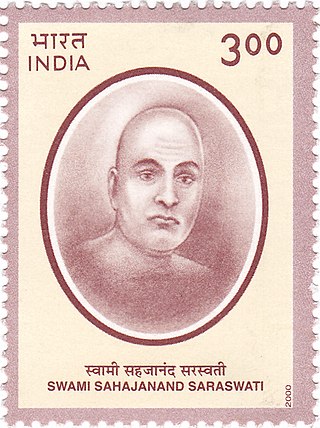Related Research Articles

The Congress Socialist Party (CSP) was a socialist caucus within the Indian National Congress. It was founded in 1934 by Congress members who rejected what they saw as the anti-rational mysticism of Gandhi as well as the sectarian attitude of the Communist Party of India towards the Congress. Influenced by Fabianism as well as Marxism-Leninism, the CSP included advocates of armed struggle or sabotage (such as Yusuf Meherally, Jayaprakash Narayan, and Basawon Singh as well as those who insisted upon Ahimsa or Nonviolent resistance. The CSP advocated decentralized socialism in which co-operatives, trade unions, independent farmers, and local authorities would hold a substantial share of the economic power.

All India Kisan Sabha, is the peasant or farmers' wing of the Communist Party of India, an important peasant movement formed by Sahajanand Saraswati in 1936.

Sahajanand Saraswati was an ascetic, a nationalist and a peasant leader of India. Although born in United Provinces, his social and political activities focussed mostly on Bihar in the initial days, and gradually spread to the rest of India with the formation of the All India Kisan Sabha. He had set up an ashram at Bihta, near Patna, Bihar carried out most of his work in the later part of his life from there. He was an intellectual, prolific writer, social reformer and revolutionary.

Basawon Singh or Basawan Singh, also known as Basawon Sinha, was an Indian independence activist and a campaigner for the rights of the underprivileged, and industrial and agricultural workers.
A peasant movement is a social movement involved with the agricultural policy, which claims peasants rights.

Bhumihar, also locally called Bhuinhar and Babhan, is a Hindu caste mainly found in Bihar, the Purvanchal region of Uttar Pradesh, Jharkhand, the Bundelkhand region of Madhya Pradesh, and Nepal.
Yamuna Karjee (1898-1953) was an Indian independence activist.
Yadunandan Sharma (1896–1975) was an Indian peasant leader and national liberation figure from the Indian state of Bihar. He had started a movement for the rights of tillers against the zamindars and Britishers at Reora celebrated as the Reora Satyagraha.

Hare Krishna Konar was an Indian Marxist revolutionary, peasant leader, agricultural theorist, and politician who was one of the founding members of the Communist Party of India (Marxist) and was the chief architect of India's first and largest agrarian reform in West Bengal. Between the 1960s and 1970s, he became one of the principal leaders of Communist movements in India. In 1932, Konar was deported to the Cellular Jail of the Andamans for 6 years at the age of 18 for his involvement in the Begut Robbery case of the Jugantar Party; there he took part in the first hunger strike, and in 1935 he founded the Communist Consolidation and led the historical second hunger strike.
The Central Organising Committee, Communist Party of India (Marxist–Leninist) Party Unity, more commonly known as CPI(ML) Party Unity or simply 'Party Unity', was a communist party in India 1982-1998. Narayan Sanyal alias Naveen Prasad was the general secretary of the party. Party Unity was the official organ of the party. CPI(ML) Party Unity was one of the predecessors of the Communist Party of India (Maoist).
Swami Kumaranand, born Dvijendra Kumar Naag, was an Indian politician and leader of Communist Party of India. He was a key builder of the communist movement in Rajputana and Madhya Bharat.

Deo Kumar Singh, commonly known by his nom de guerre Arvind Ji, Vikash Ji and Sujeet Ji, was an Indian politician who was the leader of the Indian Maoist movement and the Politburo Member of Communist Party of India (Maoist), a banned communist party in India. He spent his life as a student leader, a mass organiser and later led and strategised the guerrilla warfare against the Indian state.
Rajputs in Bihar are members of the Rajput community living in the eastern Indian state of Bihar. They traditionally formed part of the feudal elite in Bihari society. Rajputs were pressed with the Zamindari abolition and Bhoodan movement in post-independence India; along with other Forward Castes, they lost their significant position in Bihar's agrarian society, leading to the rise of Other Backward Classes (OBCs).
The All India United Kisan Sabha was a peasants organization in India. The AIUKS was founded around the late 1940s by Swami Sahajanand Saraswati. Sahajanand had broken away from the All India Kisan Sabha in 1945, being opposed to the increasing communist domination of the movement. To form the new AIUKS, Sahajanand gathered Congress Socialist Party members and other Indian National Congress left-wing elements.

In 1964, a major split occurred in the Communist Party of India. The split was the culmination of decades of tensions and factional infighting. When India became independent in 1947, differences arose of how to adapt to the new situation. As relations between the Nehru government and the Soviet Union improved, a faction that sought cooperation with the dominant Indian National Congress emerged within CPI. This tendency was led by S.A. Dange, whose role in the party hierarchy became increasingly controversial. When the Sino-Indian War broke out in 1962 Dange's opponents within CPI were jailed, but when they were released they sought to challenge his leadership. In 1964 the party was finally divided into two, with the left faction forming the Communist Party of India (Marxist). The split had a lot of regional variations. It also impacted other organizations, such as trade union and peasant movements. The split has been studied extensively by scholars, who have sought to analyze the various domestic and international factors involved.
Sunil Mukherjee was an Indian politician and leader of Communist Party of India. He was the founder secretary of Communist Party of India Bihar unit.

Ganesh Shankar Vidyarthi was an Indian independence activist and politician from Nawada district in the state of Bihar. He was elected to the Bihar Legislative Assembly for two terms and he was a Member of the Bihar Legislative Council for one term. He joined the Communist Party in 1942 and went on to become the State Secretary of the Communist Party of India (Marxist) as well as a member of its national Central Committee. He went to jail multiple times for a total of six years both before Independence and after due to his political participation. He was fondly called Ganeshda.
The All India Kisan Mahasabha (AIKM) is the peasants' front of the Communist Party of India (Marxist-Leninist) Liberation, and works for farmers' rights and the anti-feudal movement in India. AIKM and AIKM's Punjab-based farmers' union Punjab Kishan Union have played one of the biggest roles on 2020-21 farmers' protest.
Yadavs in Bihar refers to the people of Yadav community of the Indian state of Bihar. They are also known as Ahir, Gope, etc. The Yadavs form nearly 14.26 % of the state's population and are included in the Other Backward Class category in the Bihar state of India.

Communist movements in India refers to the various social and political movements led by communists in India. Communism in India has existed since the 1920s. Some of the major events are listed below.
References
- ↑ Das, Arvind Narayan (1983). Agrarian Unrest and Socio-Economic Change, 1900-1980. Manohar Publishers. p. 103.
- ↑ Das, Arvind Narayan (1982). Agrarian Movements in India:Studies on 20th Century Bihar. Routledge.
- ↑ Nedumpara, Jose J. (2004). Political Economy and Class Contradictions: A Study. Anmol Publications Pvt. Ltd. p. 315. ISBN 81-261-1718-4.
- Also refer :people.indiatimes.com/articleshow/813210.cms
Swami and Friends- By Arvind N Das http://www.virginia.edu/soasia/symsem/kisan/papers/swami.html